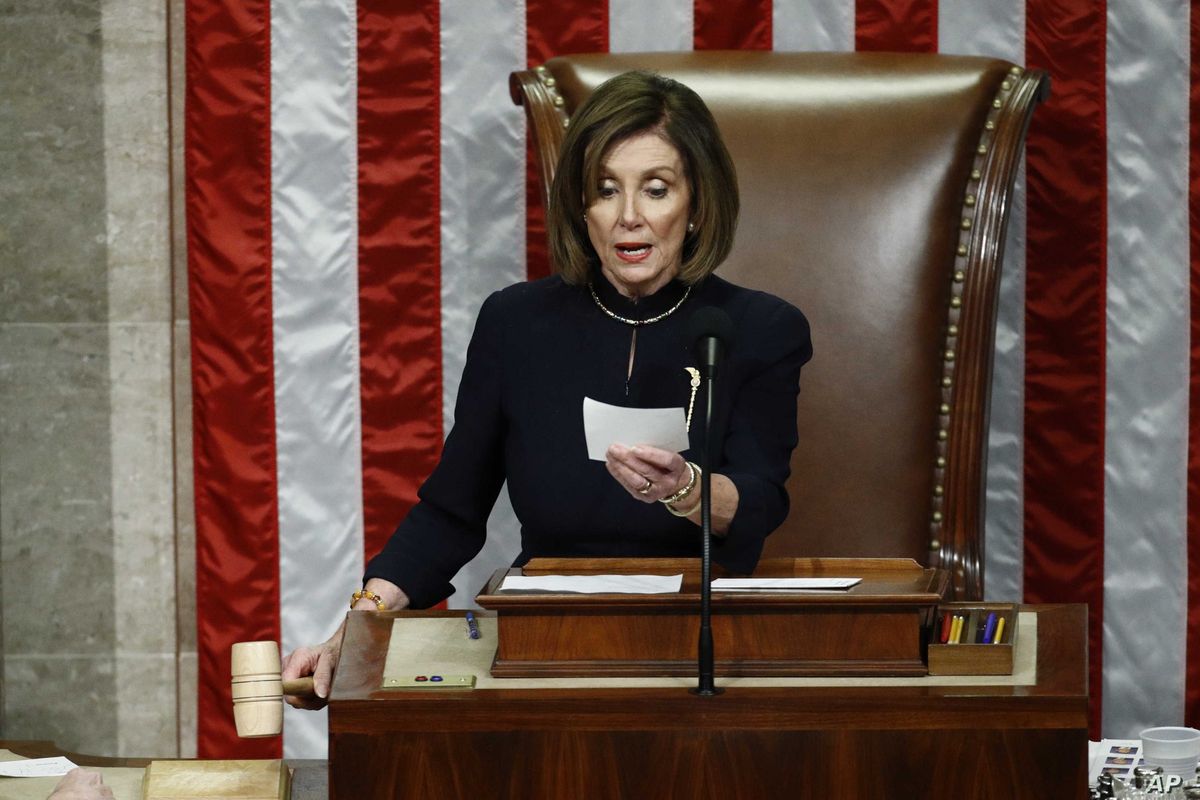Speaker Pelosi to hold onto impeachment articles

A few minutes every morning is all you need.
Stay up to date on the world's Headlines and Human Stories. It's fun, it's factual, it's fluff-free.
Although the United States House of Representatives voted to impeach President Donald Trump on December 18, Speaker of the House Nancy Pelosi has not submitted the articles of impeachment to the United States Senate. The speaker has said she wants to see how the process in the Senate will be handled before sending the articles.
This move by Pelosi has raised questions regarding her obligation to forward the articles and whether Trump has technically been impeached. It comes at a time when high-ranking members of the Republican Party within the Senate have said they have no intention of being impartial in the trial – something which has raised concerns on both sides of the aisle.
Current state of Trump’s impeachment
According to Harvard Law professor Noah Feldman, until the articles of impeachment are sent to the Senate, Trump hasn’t technically been impeached. Feldman says the Constitution does not stipulate any timeframe for the House to submit the articles to the Senate and that until this takes place, saying that Trump is impeached is “not a technically correct legal statement.”
Trump has reportedly publicly been playing down the impeachment. At rallies, he has called the process “impeachment lite”, saying the Democrats only impeached him because of their hatred for voters.
Concerns expressed by the Democrats
The two highest-ranking members of the Democratic Party, Speaker Pelosi and Senate Minority Leader Chuck Schumer have both expressed concerns over how Trump’s impeachment trial will proceed.
Pelosi has stated she does not believe the Republicans intend to hold a fair trial, saying she thinks both the president and Senate Majority Leader Mitch McConnell have gone “rogue.” For this reason, she intends to hold onto the articles of impeachment until she feels assured the trial will be fair and unbiased. This would include McConnell taking into consideration the Democrats’ desires when establishing the procedures of the trial.
Senator Schumer’s concerns lie with whether senators will be allowed to call witnesses in the trial. In particular, Schumer wants to call Trump’s chief of staff Mick Mulvaney, former National Security Advisor John Bolton, Office of Management and Budget official Michael Duffey and Robert Blair, advisor to Mulvaney. None of these men agreed to testify during the House’s impeachment inquiry, although Mulvaney was subpoenaed.
What Republicans are saying
McConnell originally said he did not plan to allow witnesses, saying it was the House’s job to investigate the charges, not the Senate’s. However, on December 23, McConnell seemingly changed his message to say he’s open to allowing witnesses but expects the trial to be quick.
A bigger concern for Democrats, however, is that in an interview with Fox News host Sean Hannity, McConnell said he is “coordinating with White House counsel” to handle the trial. He reportedly went on to say: “There is no chance the president is going to be removed from office.” In response to these remarks, Schumer released a statement calling on senators to seek “impartial justice.”
Echoing McConnell’s stated desire for a quick trial, fellow Republican Senator Lindsey Graham has claimed the trial “will die quickly” in the Senate. He reportedly stated that his mind was made up and he would not “pretend to be a fair juror.”
Calling of witnesses
There are not many precedents for an impeachment trial in the Senate. Presidents Andrew Johnson and Bill Clinton both faced trials in the Senate after being impeached by the House. Both were acquitted. President Richard Nixon resigned before a trial could take place.
Interestingly, two of the main figures in the Senate for Trump’s impeachment – Senators McConnell and Schumer – were also in the Senate during Clinton’s impeachment trial in 1999. Since that time, NPR reports the senators appear to have flipped opinions on whether witnesses are necessary. Leading up to Clinton’s Senate trial, McConnell stated it was “not unusual to have witnesses in a trial,” whereas Schumer said, “I do not think we need witnesses, because we have studied this for a year.”
In a press conference, Schumer defended his seeming switch, stating the witnesses they wish to call for the Senate trial never testified in the House inquiry and that in the Clinton trial, the witnesses called by the Republicans had all previously given testimony.
Possible Republican defections
Although McConnell said in his interview with Hannity that he hopes no Republicans would vote for Trump’s removal, there may be some fractures in the wall. Republican Senator Lisa Murkowski has expressed discomfort relating to McConnell’s promise to coordinate with the White House. In an interview with an Anchorage news station, the Alaskan senator said McConnell’s statements have “further confused the process” and stated she remains undecided on how she will vote.
Although no House Republicans voted to impeach Trump, there is supposedly a “handful” of Senate Republicans who are considering voting to remove the president from office. It is, however, not expected that enough Republicans will vote against Trump for him to be removed. Two-thirds of the Senate vote – or 67 of 100 senators – are required for removal to take place. There are currently 53 Republican senators.
Have a tip or story? Get in touch with our reporters at tips@themilsource.com




Comments ()